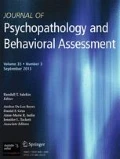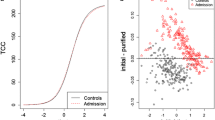Abstract
Eleven short versions of the Symptom Checklist (SCL-90-R) assessing general psychopathology, containing 5 to 53 items, were compared on the basis of data from a sample of one hundred mothers of 0-to-6-year-old children referred for treatment at a Child Psychiatric Family Day Hospital in Münster, Germany. The SCL short versions were compared with regard to internal consistency, sensitivity and specificity, ability to distinguish between subjects by a new test index (PDTS), and association with indicators of validity (SCL-90-R Global Severity Index, BDI scores). All short versions showed almost equally high internal consistency, sensitivity and specificity, and high correlations with validity indices. The PDTS test index describes a ‘good’ ability of the original SCL-90-R to differentiate between subjects, a ‘moderate’ performance for the BSI, the HSCL-25 and the SCL-27, and a ‘poor’ performance of the very short forms—according to the standards of interpreting PDTS scores. The SCL-10S is recommended for screening purposes because this scale represented the best compromise between economy and accuracy. However, for other research and clinical purposes, the use of one of the longer short versions (BSI, HSCL-25, or SCL-27) is recommended because of their superior discriminative ability.
Similar content being viewed by others
Notes
The index is fully described by a subscript for the underlying test model, which is here the classical test theory and abbreviated with PDTSCTT.
References
Asner-Self, K. K., Schreiber, J. B., & Marotta, S. A. (2006). A cross-cultural analysis of the brief symptom inventory-18. Cultural Diversity and Ethnic Minority Psychology, 12, 367–375.
Beck, A. T., Steer, R. A., & Garbin, M. G. (1988). Psychometric properties of the Beck depression inventory: twenty-five years of evaluation. Clinical Psychology Review, 8, 77–100.
Benishek, L. A., Hayes, C. M., Bieschke, K. J., & Stoffelmayr, B. E. (1998). Exploratory and confirmatory factor analyses of the brief symptom inventory among substance abusers. Journal of Substance Abuse, 10, 103–114.
Butcher, J. N., Dahlstrom, W. G., Graham, J. R., Tellegen, A., & Kaemmer, B. (1989). Minnesota multiphasic personality inventory (MMPI-2). Manual for administration and scoring. Minneapolis: University of Minneapolis Press.
Derogatis, L. R. (1992). SCL-90-R, administration, scoring & procedures manual-II for the R(evised) version and other instruments of the psychopathology rating scale series. Townson: Clinical Psychometric Research, Inc.
Derogatis, L. R. (1993). Brief symptom inventory (BSI): Administration, scoring, and procedures manual (3rd ed.). Minneapolis, MN: National Computer Systems.
Derogatis, L. R. (2000). The brief symptom inventory-18 (BSI-18): Administration, scoring and procedures manual. Minneapolis, MN: National Computer Systems.
Derogatis, L. R., Lipman, R. S., & Covi, L. (1973). SCL-90: an outpatient psychiatric rating scale—preliminary report. Psychopharmacology Bulletin, 9, 13–28.
Derogatis, L. R., Lipman, R. S., Rickels, K., Uhlenhuth, E. H., & Covi, L. (1974). The Hopkins Symptom Checklist (HSCL): a self-report symptom inventory. Behavior Sciences, 19, 1–15.
Franke, G. H. (2002). Die Symptom-Checkliste von Derogatis SCL-90-R. (2. Aufl.). Göttingen: Beltz.
Hardt, J., & Brähler, E. (2007). Symptom checklists in patients with chronic pain [German]. Schmerz, 21, 7–14.
Hardt, J., & Gerbershagen, H. U. (2001). Cross-validation of the SCL-27: a short psychometric screening instrument for chronic pain patients. European Journal of Pain, 5, 187–197.
Hautzinger, M., Bailer, M., Worall, H., & Keller, F. (1995). Beck-depressions-inventar (BDI). Testhandbuch. Bern: Hans Huber.
Hesbacher, P. T., Rickels, K., Morris, R. J., Newman, H., & Rosenfeld, H. (1980). Psychiatric illness in family practice. Journal of Clinical Psychiatry, 41, 6–10.
Hessel, A., Schumacher, J., Geyer, M., & Brähler, E. (2001). Symptom-Checkliste SCL-90-R: Testtheoretische Überprüfung und Normierung an einer bevölkerungsrepräsentativen Stichprobe. Diagnostica, 47, 27–39.
Hoffmann, N. G., & Overall, P. B. (1978). Factor structure of the SCL-90 in a psychatric population. Journal of Consulting and Clinical Psychology, 46, 1187–1191.
Jackson, D. N. (1989). Basic personality inventory. Port Huron, MI: Research Psychologists.
Klaghofer, R., & Brähler, E. (2001). Konstruktion und Teststatistische Prüfung einer Kurzform der SCL-90-R. Zeitschrift für Klinische Psychologie, Psychiatrie und Psychotherapie, 49, 115–124.
Lee, B., Kaaya, S. F., Mbwambo, J. K., Smith-Fawzi, M. C., & Leshabari, M. C. (2008). Detecting depressive disorder with the Hopkins Symptom Checklist-25 in Tanzania. International Journal of Social Psychiatry, 54, 7–20.
Loutsiou-Ladd, A., Panayiotou, G., & Kokkinos, C. M. (2008). A review of the factorial structure of the brief symptom inventory (BSI): Greek evidence. International Journal of Testing, 8, 90–110.
Lovibond, S. H., & Lovibond, P. F. (1995). Manual for the depression anxiety stress scales (DASS). Sydney: Psychology Foundation.
Lutz, W., Tholen, S., Schürch, E., & Berking, M. (2006). Die Entwicklung, Validierung und Reliabilität von Kurzformen gängiger psychometrischer Instrumente zur Evaluation des therapeutischen Fortschritts in Psychotherapie und Psychiatrie. Diagnostica, 52, 11–25.
Müller, J. M. (2006a). The probability of obtaining two statistically different test scores as a test index. Educational and Psychological Measurement, 66, 601–611.
Müller, J. M. (2006b). SAS macros to compute the descriptive test index PDTS. Applied Psychological Measurement, 30, 345–346.
Nguyen, T. D., Attkisson, C. C., & Stegner, B. L. (1983). Assessment of patient satisfaction: development and refinement of a service evaluation questionnaire. Evaluation and Program Planning, 6, 299–314.
Prelow, H. M., Weaver, S. R., Swenson, R. R., & Bowman, M. A. (2005). Preliminary investigation of the validity and reliability of the brief-symptom inventory-18 in economically disadvantaged Latina American mothers. Journal of Community Psychology, 33, 139–155.
Ramchandani, P., Stein, A., Evans, J., & O’Connor, T. G. (2005). Paternal depression in the postnatal period and child development: a prospective population study. The Lancet, 365, 2201–2205.
Recklitis, C. J., Parsons, D. K., Shih, M.-C., Mertens, A., Robison, L. L., & Zeltzer, L. (2006). Factor structure of the brief symptom Inventory-18 in adult survivors of childhood cancer: results from the childhood cancer survivor study. Psychological Assessment, 18, 22–32.
Richter, P., Werner, J., Heerlein, A., Kraus, A., & Sauer, H. (1998). On the validity of the Beck depression inventory. Psychopathology, 31, 160–168.
Rosen, C. S., Drescher, K. D., Moos, R. H., Finney, J. W., Murphy, R. T., & Gusman, F. (2000). Six- and ten-item indexes of psychological distress based on the Symptom-Checklist 90. Assessment, 7, 103–111.
Schauenburg, H., & Strack, M. (1998). Die Symptom-Checklist-90-R zur Darstellung von statistischen und klinisch signifikanten psychotherapie-ergebnissen. Psychotherapie, Psychosomatik, Medizinische Psychologie, 48, 257–264.
Schauenburg, H., & Strack, M. (1999). Measuring psychotherapeutic change with the Symptom Checklist-90-R. Psychotherapy and Psychosomatics, 68, 199–206.
Strand, B. H., Dalgard, O. S., Tambs, K., & Rognerund, M. (2003). Measuring the mental health status of the Norwegian population: a comparison of the instruments SCL-25, SCL-10, SCL-5 and MHI-5 (SF-36). Nordic Journal of Psychiatry, 57, 113–118.
Tambs, K., & Moum, T. (1993). How well can a few questionnaire items indicate anxiety and depression? Acta Psychiatrica Scandinavica, 87, 364–367.
Von Hofacker, N., & Papousek, M. (1998). Disorders of excessive crying, feeding, and sleeping: the Munich interdisciplinary research and intervention program. Infant Mental Health Journal, 19, 180–201.
Ware, J. E., Jr., & Sherbourne, C. D. (1992). The MOS 36-item shortform health survey (SF-36). I. Conceptual framework and item selection. Medical Care, 30, 473–483.
Winokur, A., Winokur, D. F., Rickels, K., & Cox, D. S. (1984). Symptoms of emotional distress in a family planning service: stability over a four-week period. British Journal of Psychiatry, 144, 395–399.
Expertise
Statistical methods; Analyses of questionnaires; Research consultant
Projects
Funding of the project ‘Development, Application and Meta-Analysis of test index of psychological assessment’
Author information
Authors and Affiliations
Corresponding author
Rights and permissions
About this article
Cite this article
Müller, J.M., Postert, C., Beyer, T. et al. Comparison of Eleven Short Versions of the Symptom Checklist 90-Revised (SCL-90-R) for Use in the Assessment of General Psychopathology. J Psychopathol Behav Assess 32, 246–254 (2010). https://doi.org/10.1007/s10862-009-9141-5
Published:
Issue Date:
DOI: https://doi.org/10.1007/s10862-009-9141-5




